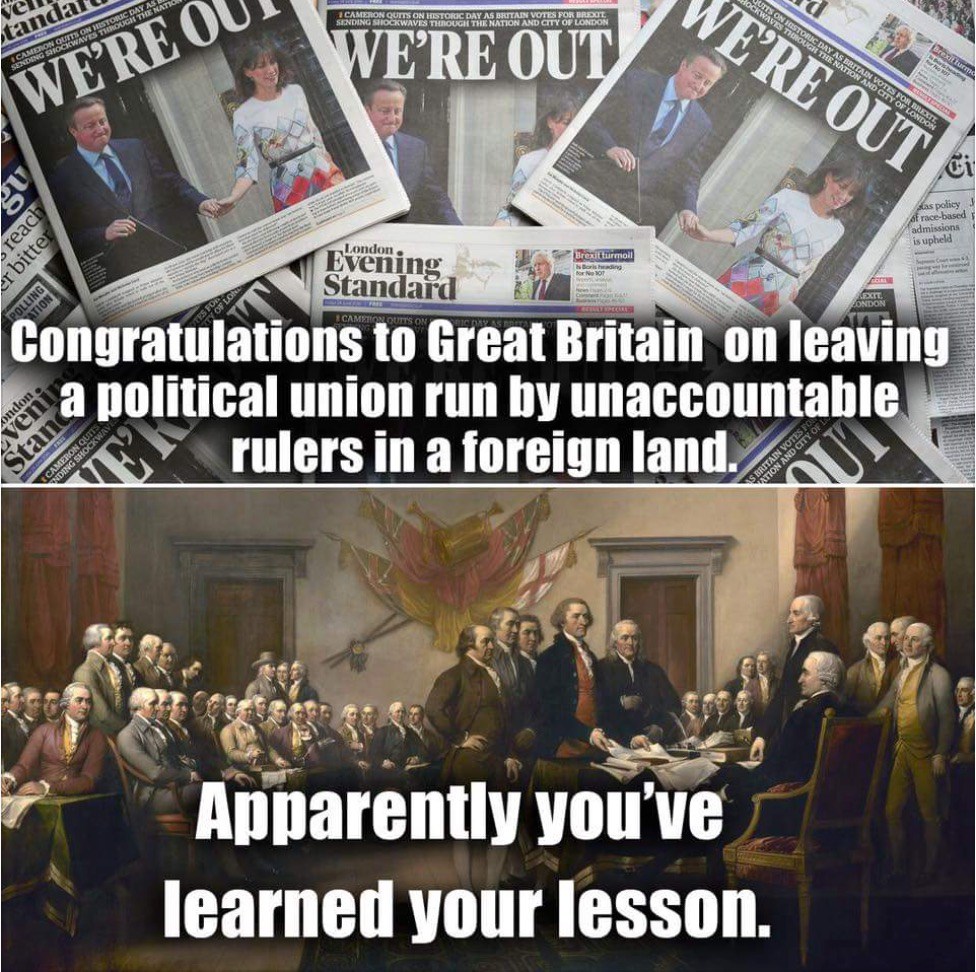Three revolutions: American, French, Russian. A world of difference when you compare them.
The American Revolution, in my view, was not a revolution in the popular understanding of that term, whereas the other two were. In fact, my students know that I famously (infamously?) rename the American Revolution as The American War for Continued Self-Government.
Not very catchy, I know, but more accurate. I point to the fact that this perceived revolution was for the maintenance of the rights and liberties that were already granted. When the British government refused to acknowledge those rights and liberties, the colonists, in self-defense, were forced to take up arms.
The result was a government that certainly had some new and improved features, but it was hardly anything that overturned the basics of representative government that Britain supposedly upheld.
I like a couple of the memes making the rounds after the Brexit vote, as Britain decided to leave the European Union:


The French Revolution may have been inspired, to some degree, by what happened in America, but the nature of it was altogether different. Whereas Americans fought for self-government, the protection of property, and liberty of conscience with a reliance upon Christian faith, the French divorced themselves from that faith and a bloodbath ensued. What did they achieve? They replaced an insensitive king with Napoleon Bonaparte, an unaccountable dictator.
The Russian Revolution also is known as the Bolshevik Revolution, led by the bloodthirsty tyrant Vladimir Lenin. He, and his successor, Josef Stalin, set up a socialist/communist state that attempted to destroy all religion and constitutional limitations, and became one of the most genocidal nations in the history of man. Stalin alone murdered 30 million of his own citizens.
So, no, I don’t link these three revolutions.
That’s why I love to teach American history and point to what the Founders sought to accomplish. The Fourth of July—the day the wording of the Declaration of Independence was approved—should be a time for celebration.
I have to admit, though, that these last two Independence Days have been muted celebrations for me. The Supreme Court decision in favor of same-sex marriage occurred just prior to Independence Day 2015 and we have devolved since then.
Religious liberty is under greater attack than ever in our nation’s history. The Democrat party has given itself over completely to an anti-Christian philosophy. The Republican party, which is supposed to be the counterweight politically to the radicalism of the Democrats, has tied its future to a man totally unworthy of the presidential office.

Yes, my outlook is somewhat subdued today. The bright side of all this is a reminder that this world is not our final home and that no nation or government is our salvation. Our final home is in the presence of God and He is our hope and our salvation. Let’s keep our priorities straight and He still may have mercy on us.
America, bless God, and then He may have a reason to bless us.
